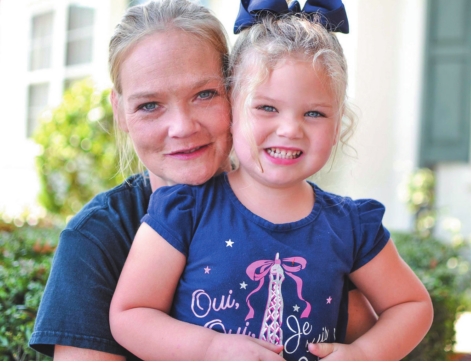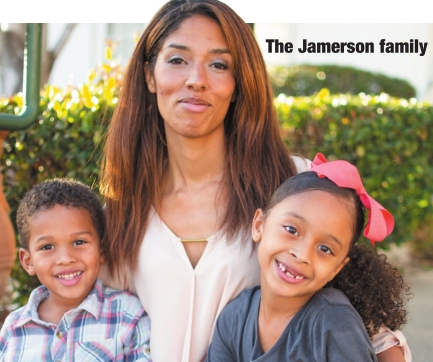INNOVATION IN TACKLING HOMELESSNESS

Providence House celebrates 30 years
Founded in 1988 by Mary Anne Selber and Jean Sayres as the Evergreen House, the Providence House celebrates its 30th birthday this year.
As the Evergreen House, the organization offered temporary shelter services for homeless families. In 1992, it was re-named the Providence House and shifted its mission to cycling families out of homelessness by providing long-term, sustainable solutions to socio-economic problems the residents experience.
The Providence House is such a staple in the community that, as the old cliché goes, it really needs no introduction. It’s been an overwhelming success, attested to by this birthday and by its perception in Shreveport-Bossier and further afield. 
However, the Providence House has no intention of resting on its laurels, as Executive Director Verni Howard makes clear:
“We thought, ‘If we keep doing the same thing in the same way, we’re going to get the same results.’ Our results have been great: We’ve been able to house people; we’ve been able to get people back on their feet towards self-sufficiency. However, we’ve seen some families who were on their feet, but then three years later you see them again, or five years later, or you see their kids. We had to sit down to figure out what is that missing piece that would return a person to homelessness. ... So, we put some models together, we looked at what was happening in other parts of this country, we looked at what was happening in other countries. ... You don’t just look at your four walls.
You’ve got to look beyond your state, beyond just what we know.’ As evidenced by Howard’s discussion of the new work being done just since she became the executive director in 2015, Providence House maintains the adaptability of its early days. Just as it shifted and expanded its mission to transition from the Evergreen to the Providence House based on what was needed in the community, the organization still bases its projects and plans of operation around a collaborative approach to gathering knowledge and forming best practices. “We have an event called ‘An Evening with the Executive Director.’ This is a time where we have staff watch the children so that the residents get to come and share. It is not one of those sessions where they get to moan and complain. Our first session was on expectations — what do you expect out of this experience at Providence House, what do you expect of the staff? What do you expect over the next 30 days, 60 days? So, what I’m doing is helping them to create a road map for their exodus out of homelessness. They shared our expectations of us, but we also shared our expectations of them.”
This collaborative approach to conducting operations extends to initiatives to work with community partners as well.
This includes other local non-profits, such as using the Food Bank of Northwest Louisiana to stock their kitchens by planning meals weeks in advance.
This dynamic adaptability and attention to researching best solutions has been apparent in the ethos of the organizations since the beginning. Before founding what is now Providence House, Selber and Sayres traveled to research organizations tackling homelessness in other parts of the state. They found that projects often didn’t go much further than offering a bed for the night and a meal.
While acknowledging the importance of these types of services, Selber and Sayres sought to build an organization that could offer more.
 The
presence of the Providence House in Shreveport makes the work the
organization does seem like the norm for addressing homelessness in an
urban environment—a comprehensive and natural solution to a ubiquitous
problem. However, their dynamic and collaborative approach to tackling a
problem faced by every city is truly unique. That, thirty years on, the
work of the Providence House seems a natural and irreplaceable aspect
of the Shreveport community is a testament to what a powerful
institution Selbers and Sayres built. Selbers describes the current
Executive Director (Verni Howard) and former Executive Director (Simone
Hennessee) as ‘powerhouses.’ The Providence House’s longevity and
success is also attributed to the founders’ commitment to building
something that could not only function without them, but also whose
mission statement would be powerful and strong enough to not depend on
any one individual.
The
presence of the Providence House in Shreveport makes the work the
organization does seem like the norm for addressing homelessness in an
urban environment—a comprehensive and natural solution to a ubiquitous
problem. However, their dynamic and collaborative approach to tackling a
problem faced by every city is truly unique. That, thirty years on, the
work of the Providence House seems a natural and irreplaceable aspect
of the Shreveport community is a testament to what a powerful
institution Selbers and Sayres built. Selbers describes the current
Executive Director (Verni Howard) and former Executive Director (Simone
Hennessee) as ‘powerhouses.’ The Providence House’s longevity and
success is also attributed to the founders’ commitment to building
something that could not only function without them, but also whose
mission statement would be powerful and strong enough to not depend on
any one individual.
Selber describes the current executive director (Verni Howard) and former executive director (Simone Hennessee) as “powerhouses.” The Providence House’s longevity and success are also attributed to the founders’ commitment to building something that could not only function without them, but also whose mission statement would be powerful enough and strong enough not to depend on any one individual.
When asked what Providence House has taught her over the past three decades, Selber replied, “It makes you not quite as judgmental of people who aren’t like you. ... It expands your humanity, and I think all of us can use that.” Indeed, we all can, and Providence House has helped our community in that process during the past 30 years, and I’ve no doubt will continue to do so for the next 30.
FOR MORE INFORMATION:
theprovidencehouse.com For updates on the Providence House: Follow them on Facebook: https://www.facebook.com/providencehouse/ Twitter: @PHShreveport
